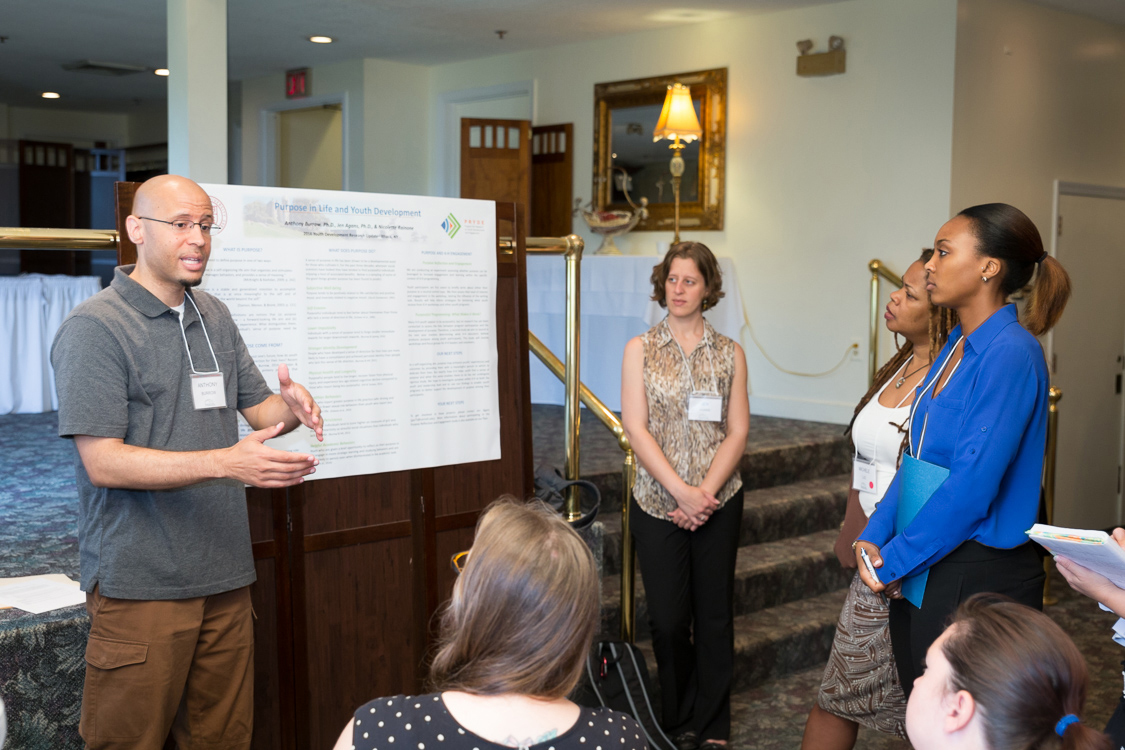Conference shares latest youth development research
By Olivia M. Hall

Runaway slaves, social media, environmental education, the wisdom of elders – the sixth annual Youth Development Research Update June 1-2 in Ithaca covered a lot of ground.
Funded by the Bronfenbrenner Center for Translational Research (BCTR) in the College of Human Ecology, the conference brought together 55 Cornell Cooperative Extension educators and program leaders, youth service providers from community agencies and Cornell faculty members from across campus to explore how these and other topics relate to children and teens and how to better serve their needs.
“This event creates a unique, interactive space for practitioners and researchers to engage in sustained dialogue about ongoing research and the potential for future collaboration,” said assistant professor of human development Anthony Burrow, who organized the event with Jutta Dotterweich, director of training for BCTR’s ACT for Youth project.
Stephanie Graf, a Youth and Family Program leader with Jefferson County Extension, has developed several fruitful partnerships over five years of attending the conference. For a past project on Defiant Gardens for military families, for example, she worked with professor of natural resources Marianne Krasny, who this year spoke about environmental education programs to support positive youth development.
Krasny outlined how environmental stewardship activities have potential to stimulate positive growth in young people, leading to healthier physical habits, skills for future employment or greater self-confidence and emotional self-regulation. Educators, meanwhile, face the challenge of guiding youth without overly imposing their own experiences and decision-making – a dilemma for which she suggested a reflective practice of providing structure, support, mutual learning, open communication and ultimate accountability. “Positive youth development is possible,” she said, “but it’s not easy.”
Graf found research by Christopher Wildeman, associate professor of policy analysis and management and a BCTR faculty fellow, on the stigma associated with parental incarceration to be equally relevant to her work, where she sometimes encounters children of inmates in her county’s after-school programs.
Wildeman reviewed research on the United States’ historically high rate of incarceration – which at 500 prisoners per 100,000 citizens far outstrips other developed democracies – and its disproportionately negative impact on minority families. He then described a new experimental study in which teachers, presented with hypothetical students new to their classroom, expected more behavioral problems and less competence from children whose fathers are in prison. These results support the “sticky stigma” attached to paternal incarceration, Wildeman said.
History professor Edward Baptist drew a link from Wildeman’s talk when discussing his Freedom on the Move project. “I think that mass incarceration probably wouldn’t exist and certainly wouldn’t have the shape that it does without the strategies that were created to try to control and continue to force people into the institution of slavery,” Baptist said.
One such strategy was for slave masters to place runaway slave ads in newspapers, reinforcing the persistent scrutiny under which even free African-Americans found themselves. Collaborating with colleagues at Cornell and other universities, Baptist has built a crowdsourcing platform that will engage the public in transcribing and parsing data from some 200,000 ads that survive from the period between 1722 and 1865.
A poster session on the Program for Research on Youth Development and Engagement (PRYDE) concluded the conference, allowing attendees to question researchers about work in its four focus areas: healthy transitions for adolescents; intergenerational connections between high schoolers and older adults; the productive use of social media; and leveraging youth purpose to increase engagement and learning in 4-H.
Burrow, PRYDE co-director, said: “The update provides a rare space for researchers to attend a conference alongside needed collaborators. It’s like having your cake and eating it, too.”
Olivia M. Hall, Ph.D. ’12, is a freelance writer and anthropologist.
Media Contact
Get Cornell news delivered right to your inbox.
Subscribe